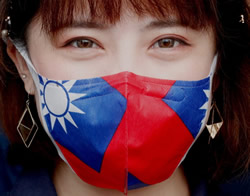Wen-Ti Sung* says Taiwan’s successful handling of the COVID-19 crisis has seen it emerge as a standard bearer for the liberal democratic system of governance.
 Taiwan’s pragmatic ‘warm power’ diplomacy during the COVID-19 outbreak represents a low-key approach to boosting its international participation.
Taiwan’s pragmatic ‘warm power’ diplomacy during the COVID-19 outbreak represents a low-key approach to boosting its international participation.
At the same time it minimises the burden for its sympathetic international partners and friends.
President Tsai Ing-Wen’s successful management of the pandemic has also made a strong case for liberal democracies as the superior form of government for a public health crisis.
This, in turn, has translated into more positive international publicity for Taiwan, as well as greater opportunities to network with other States’ relevant Agencies.
China, the alleged origin of the virus, has less than 100,000 confirmed cases.
In contrast, several Western liberal democracies have suffered greatly, with more than a million confirmed cases in the United States and more than 100,000 each in Spain, Italy, the United Kingdom, Germany, and France.
This development might have engendered yet another blow to liberal democracies in the continuing battle over perceived performance legitimacy with authoritarian regimes.
It is in this context that Taiwan finds a way into the international narrative.
Despite Taiwan’s geographic proximity, as well as close economic and demographic linkages with China, it has kept its COVID-19 toll remarkably low: Less than 450 confirmed cases to date and a death toll in the single digits.
Taiwan’s performance provides solid proof that liberal democracies can be just as effective in public health governance as authoritarian polities.
In so doing, Taiwan helps prevent the COVOD-19 crisis from diminishing the case for democracy in the global marketplace of ideas.
Accordingly, Taiwan’s public diplomacy efforts have focused on presenting itself as a persecuted but nonetheless gracious international Good Samaritan.
In an opinion piece for Time Magazine, Ms Tsai says that although Taiwan has been “unfairly excluded” from the World Health Organization (WHO), it remains “willing and able” to contribute to global public health.
Taiwan’s ‘mask diplomacy’ represents the first significant initiative in this area.
In a campaign titled Taiwan Can Help; Health for All, Taipei has announced three rounds of international humanitarian assistance in the form of mask donation.
For its international ‘Good Samaritanship’, Taiwan has earned an extraordinary amount of goodwill from numerous Western Governments, especially on Twitter.
As an example, President of the European Commission, Ursula von der Leyen became the first EC President to directly address Taiwan in an official communication when she thanked it for mask donations.
Taiwan is capitalising on this outpouring of international goodwill to enhance bilateral relations and rally support for regaining participation at the World Health Assembly (WHA).
Taiwan’s Ministry of Foreign Affairs has not been shy about espousing what it calls “the Taiwan Model for Combating COVID-19”.
New Zealand’s Prime Minister, Jacinda Ardern and the US Secretary of State, Mike Pompeo have both claimed to have borrowed significantly from this approach.
Ultimately, whether Taiwan’s bid for WHA observer status comes to fruition or not may be secondary.
During COVID-19, Taipei has branded itself as a champion of liberal democracies in the continuing contest of legitimacy between liberal and authoritarian regime types.
In this sense, even if Taiwan is losing the WHA 2020 battle, it may still be winning the war of gaining greater international space and prestige.
*Wen-Ti Sung is a visiting fellow at the Australian Centre on China in the World at The Australian National University. He tweets at @wentisung.
A fuller version of this article first appeared on the Pacific Forum e-journal.


